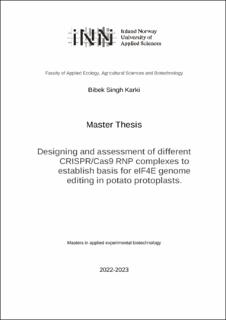| dc.description.abstract | Potato crop is considered as a key to food security; however, potato virus Y infection have been causing seed potato and primary yield loss of up to 80%. Moreover, none of the commercially available potato cultivars has been reported to present natural resistance against potato virus Y. Recently, the CRISPR/Cas9 system has been widely used for precise genome editing and efficient plant mutation research and breeding. This system depends on single guide RNA to guide the Cas9 protein mediated genome editing. Thus, designing and assessing of target gene or allele specific single guide RNA is a crucial step in precise genome editing. Furthermore, commercial potato cultivars are highly heterozygous and encompasses several single nucleotide polymorphisms. Hence, this study aimed to identify allelic variants of eIF4E gene in Desirée, Kuras, Celandine, and Innovator potato cultivars, and to design and analyse suitable candidate sgRNAs to perform CRISPR/Cas9 ribonucleoprotein (RNP) based genome editing to obtain potato virus Y-resistant potatoes. Firstly, using PCR amplification combined with Sanger sequencing, different allelic variants specific to four cultivars were identified. So far, 3 allelic coding sequences were identified from Desirée cultivar, and 2, 4, and 5 variants were detected from Celandine, Kuras and Innovator, respectively. Using the coding sequences seven different sgRNAs were designed, in-vitro transcribed and assessed by performing in-vitro cleavage assay. The results indicated that the SpCas9 derived by all seven sgRNAs, cleaved the three allelic CDS complementary DNA specific to Desirée cultivar. Finally, two different protoplast isolation tests were performed, resulting in isolation of moderate number (1 ×10^4 protoplasts / µl, and 2× 10^6 protoplasts /µl) of protoplasts from Desirée and Kuras cultivars respectively. Thus, this study concluded that a basic platform was established for further RNP complex based in-vivo eIF4E genome editing, on potato protoplasts to produce PVY resistant potatoes. | |
